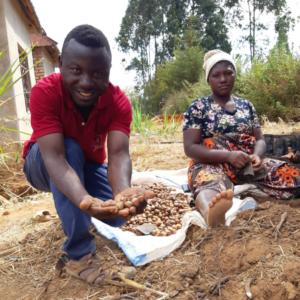 Magunguli, 2022-09-25. Ragpa Tweve and his wife Christina run a tree nursery for afforestation in Magunguli, Tanzania. They are now experimenting with propagating indigenous forest trees with edible wild fruits: Mikusu, for example, are very popular. They sell the seedlings to farmers for their reforestations. Their vision: Farmers are preserving the natural forest plus earn money by processing and marketing the wild fruits. They receive support from farip for their pioneering work. Our vision is a combination with the GRACOMA project: The trees enable CO2-sequestration in addition to yielding popular fruits.
Magunguli, 2022-09-25. Ragpa Tweve and his wife Christina run a tree nursery for afforestation in Magunguli, Tanzania. They are now experimenting with propagating indigenous forest trees with edible wild fruits: Mikusu, for example, are very popular. They sell the seedlings to farmers for their reforestations. Their vision: Farmers are preserving the natural forest plus earn money by processing and marketing the wild fruits. They receive support from farip for their pioneering work. Our vision is a combination with the GRACOMA project: The trees enable CO2-sequestration in addition to yielding popular fruits.
THE FOREST RANGER WITH HIS TREE NURSERY
Magunguli, 2022-06-09. Ragpa lives with his young family in the remote village of Magunguli on the edge of Udizungwa National Park. Almost every family there also grows their own Pinus and Eucalyptus trees on their own land. Ragpa started a tree nursery in 2018 with loans from farip. He is now growing Pinus and Eucalyptus, but also indigenous trees such as the Mikusu.
HISTORY OF THE PROJECT
2019-12-09. While the tree nursery makes a lot of sense on its own, the project has to be seen in the context of the ideas around “GRACOMA”. A loose group of 60 farming families, the “Mgololo Tree Planter Association”, has been exploring forestry loan collateral for years.
The idea is to be able to offer their own growing trees as security for credits. It quickly became clear that there is huge economic and also ecological potential in planted trees. Active implementation, however, remained a challenge.
The central requirement is that lenders who accept trees as collateral have to be able to prove over many years that the trees are still there, being nurtured, and owned by the people who took the loans.
The farmers soon realised that this would require an independent organization for supervision, monitoring and control of the forest plots on behalf of the lenders. This led to the idea of setting up a company called Growing Assets Collateral Management (GRACOMA). This company would train people from the village to inspect specially registered forest plots, and also empower the farmers to make the most of their forests in a sustainable way. They would then call such forest wardens “Watunza Misitu” (singular Mtunza misitu).
